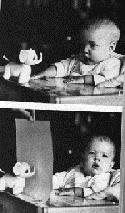
The sensorimotor stage is the first of the four stages Piaget uses to definecognitive development. Piaget designated the first two years of an infants lifeas the sensorimotor stage.
During this period, infants are busy discovering relationships betweentheir bodies and the environment. Researchers have discovered that infants haverelatively well developed sensory abilities. The child relies on seeing,touching, sucking, feeling, and using their senses to learn things aboutthemselves and the environment. Piaget calls this the sensorimotor stagebecause the early manifestations of intelligence appear from sensory perceptionsand motor activities.
Through countless informal experiments, infants develop the concept ofseperate selves, that is, the infant realizes that the external world is not anextension of themselves.
Infants realize that an object can be moved by a hand (concept ofcausality), and develop notions of displacement and events. An importantdiscovery during the latter part of the sensorimotor stage is the concept of "objectpermanence".

Object permanence is the awareness that an object continues to existeven when it is not in view. In young infants, when a toy is covered by a pieceof paper, the infant immediately stops and appears to lose interest in the toy(see figure above).This child has not yet mastered the concept of objectpermanence. In older infants, when a toy is covered the child will activelysearch for the object, realizing that the object continues to exist.
After a child has mastered the concept of object permanence, the emergenceof "directed groping" begins to take place. With directedgroping, the child begins to perform motor experiments in order to see what willhappen. During directed groping, a child will vary his movements to observe howthe results will differ. The child learns to use new means to achieve an end. The child discovers he can pull objects toward himself with the aid of a stickor string, or tilt objects to get them through the bars of his playpen.
